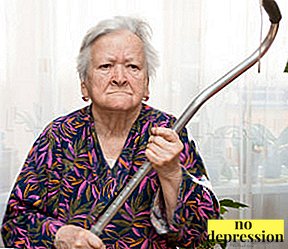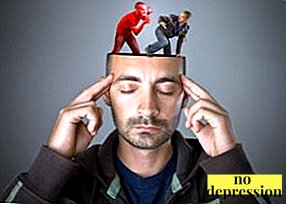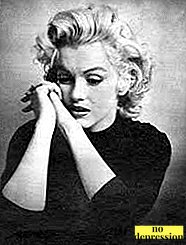In old age people are not always able to distinguish real events from the ones he sees.
And the more health problems there are, the weaker the ability to understand the line between this world and the invented one.
Problem overview

These are images, sounds, taste or tactile sensations that do not exist in reality, arising directly in the imagination an elderly person because of a breakdown of the brain and life-supporting systems of the body.
The reasons for the generation of illusions by the brain are different and can be the result of a stroke, mental disorders, age-related changes in brain activity, etc.
As a result of hallucination, an elderly person may be worried, to make life-threatening, health actions. But, fortunately, not in all cases unreal “subjects-objects” bring a lot of harm to the patient and his surroundings.
With adequate therapy and attentive attitude on the part of the caregivers, seeing what is not really can live the rest of his time quite happily.
Causes of senile visions
The main factor of the propensity to periodically or most of the time of the waking period “dwell” in another world is degenerative processes in the brain.

Sensitive and subjective experiences are not uncommon after severe head injuries, with senile dementia, encephalopathies.
These are frequent “guests” in old people who are sick with parkinsonism or who suffer from Alzheimer's.
In the first case, family members of an elderly person diagnosed with this disease should be prepared for problems with hallucinations in the near or distant future.
Since this is a natural consequence of this ailment and it develops in 60% all patients with this diagnosis.
In the second case, visions begin in many patients, even at an early stage of the disease, and become an integral part of the life of an elderly person.
Other causes of visions in the elderly:
- the splitting of mental activity and delusional vision in the background of aggravated or continuous schizophrenia;
- exacerbation of epilepsy;
- oncological changes in the brain;
- psychosis due to delirium against the backdrop of alcoholism, exacerbation of the disease, causing panic attacks;
- condition before fatal outcome. The beginning pre-death nonsense is a typical reaction of the brain to the final extinction;
- the abolition of the drug with a pronounced sedative effect or the use of a potent new drug, with an unknown reaction on the part of the patient;
- systematic use of potent drugs with sulfonamides in the composition, anticonvulsant action, lowering the pressure or eliminating an allergic reaction;
- lack of sleep with an increased wakefulness interval;
- prolonged isolation from the world;
- an exhausting disease, due to which all life-supporting systems of a person have been subjected to severe tests for a long time and this has affected the work of the brain.

Types and forms of pathology
The brain jokes are expressed in the imaginary sensations of someone's touch, nonexistent tastes, smells and sounds. And in terms of brightness, they can be just as impressive as visuals.
But in any case, the degree of excitement of the patient with hallucination depends on the emotional perception of a non-existent phenomenon.
Any of the listed manifestations may be caused by:
- Reflex feedback on the excitation of one or several nodes in the life-supporting system of the body. For example, changing the dosage of a strong medication or an attack of epilepsy.
- Spontaneous stimulus response. Depending on the root cause of changes in brain activity, a conflict with someone from caring people, a loud sound as a result of a natural phenomenon or human activity can act as a catalyst.
- Functional. In schizophrenia, patients often distort their body's reactions to stimuli. For example, having struck due to inaccurate action, they associate an unpleasant feeling with the activity of an imaginary aggressor, and do not understand that they themselves have become a provocateur of the problem.

Specific subjects seen by older people with hallucinations can be the "ghosts" of the past, whose images are remembered by contact with prototypes in real life.
But the occurrence of subjects who are a sort of team “hodgepodge” from those seen in cinema and imagined, never existed in reality entities
In addition to people, patients can “see” animals, insects, and animated interior items. Such visions are accessible for perception by any sense organ, that is, are visible, audible, perceived by smell or touch for a patient.

And in some cases, contact with a non-existent something happens in maximum real format: and observed, and felt sick.
It is very difficult to predict that the next time the patient's brain will create in the imagination of the latter.
Some people have visions repetitive characterand some have new ones every time.
The following factors influence the characteristics and brightness of hallucinations:
- State of the vascular system, thyroid gland. Impaired vascular permeability, hormonal imbalance prevents the brain from responding adequately to stimuli and creates conditions for the development of visions.
- Hearing or vision problemsBoth of these factors. Isolation from the world due to a person’s physical disability stimulates the brain to create subjects and objects to which it will react - the nervous system needs work and with a deficit of external stimuli, it creates imaginary ones.
- The fact of the tragedy in the past patient, because of which he had a mental disorder.
In an effort to get rid of the growing irritation against the background of the old experience, the brain systematically generates a terrible picture, forcing a person to live a problem over and over again, so that he would react to it as brightly as possible and then forget.
But in case of problems with the psyche, full working out is difficult, so the situation will be repeated to a conditional infinity.
- The amount of hallucinogenic substance in the bodytaking with medication.
- Degree of emotional tension a patient because of a difficult environment against the background of a conflict with relatives, medical staff, roommate, if an elderly person is hospitalized.
- Stage of development of the diseaseaffecting brain activity.

What to do?
What should I do and which doctor should I contact if an elderly person is worried about hallucinations? First confronted with the problem surrounding panic.
Firstly, this is a rather uncomfortable feeling for a healthy person, if he had not previously had experience in contact with the patient and someone else or something invisible.
Secondly, the feeling scares own helplessness, because there is no understanding how to behave so as not to provoke a flash of rage and aggression.

But there’s nothing to worry about, if the hallucination does not frighten his master and he does not start active actions, trying to defend himself or to hide from an imaginary threat.
However, it is imperative that a specialist be consulted and urgently to take care of prevention and prevent future deterioration an elderly person and a situation where his behavior becomes aggressive.
Who to contact for initial consultation?
- If an elderly person is not registered with a specialist due to a chronic serious illness, then the problem is addressed. to the family therapistif there is no good psychiatrist “within walking distance” or the latter requires the availability of the appropriate medical direction.
- In a situation where an elderly person suffers from Parkinsonism or another serious illness affecting the state of the nervous system, and was warned by the attending physician about the possibility of hallucinations, you can immediately contact supervisor.
Treatment and drugs
To control the problem is possible only after determining the cause of the hallucination. Therefore, the type of therapy and specific medications should prescribe highly medical specialist.
Typical preparations for the elimination of visions:
- Neuroleptics. Haloperidol, clozapine and other drugs of similar action contribute to the blunting of reactions of the nervous system and quickly, permanently eliminate panic attacks, muscular tightness, characteristic of hysterical seizures. However, it should be understood that after taking these medicines, a person becomes sluggish and reacts poorly to the world and environment in general. Therefore, such medicines should be a radical measure for cases with hallucinations, leading to aggressive behavior of the patient.
- Light sedatives and tranquilizers. Glycine, Phenazepam, Halition and other drugs, depending on the frequency of administration and dosage of a single tablet, help relieve tension in the nervous system and inhibit brain activity, which reacts by creating hallucinations to a problem in the body. As well as neuroleptics, eliminate excitement of the patient and make him much more passive in general than usual. At the same time, the duration of exposure to drugs and the degree of inhibition of the patient are smaller, if not affect the level of concentration of sedatives in the blood due to an increase in daily doses.

Before meeting with a specialist for the appointment of maintenance therapy, an elderly person is recommended to include herbal teas based on plants with a sedative effect in the diet.
but overdoing with a reasonable dosage is not worth it, in order not to provoke a decrease in pressure and deterioration of oxygen supply to the brain and so experiencing additional stress from other problems in the body.
What else can you do for prophylaxis appearance of hallucinations in a patient or relapse:
- Take care that the elderly person does not feel isolated. Let his brain be busy analyzing actual events and not inventing work for himself with the help of generated visions.
- Strive for a favorable atmosphere in the house: quarrels negatively affect the psyche and can provoke the formation of non-existent pictures, sounds, sensations.
- Keep order in the room of an elderly person, but ventilate, maintain sufficient humidity and clean according to the mood of the ward.

We are pretty painless to respond to children's fantasies, but very difficult to transfer the periodwhen in the invented world those who have recently been a support in life and have always given valuable advice begin to systematically find themselves.
If you look at the hallucinations of older people from the point of view of doctors, in most cases, guardian relatives should not panic because of the feeling of impending danger.
With proper control and adequate therapy This period can be experienced quite painlessly for both the elderly person and his relatives.
When hallucinations do not require treatment:



